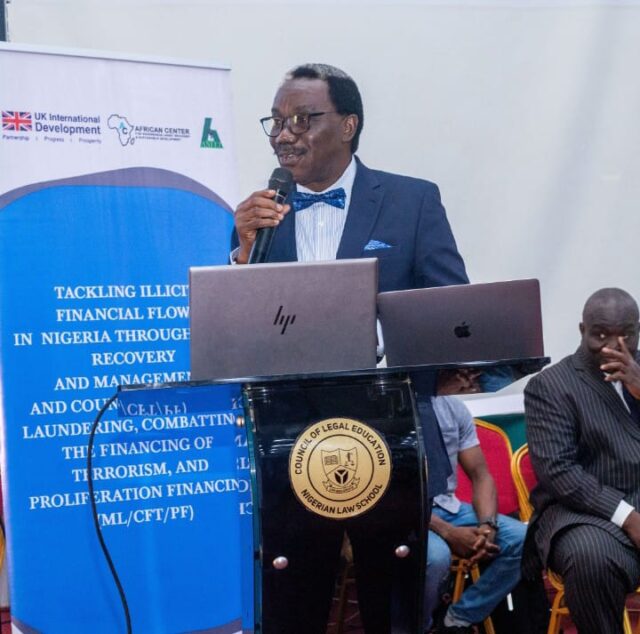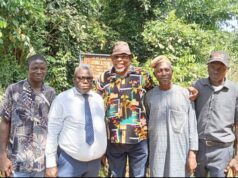By Editor
As part of measures to deepen professional ethics and compliance literacy among the legal profession’s next generation, the Nigerian Bar Association Anti-Money Laundering Committee (NBA-AMLC), in partnership with the African Center for Governance, Asset Recovery and Sustainable Development (African Center), had conducted a one-day sensitisation workshop that trained over 1,000 aspiring lawyers in AML/CFT skills and ethical practice.
The event held at the headquarters of the Nigerian Law School (NLS) in Bwari, Abuja, with participation from other Law School campuses via virtual link, forms part of the UK -Foreign, Commonwealth Development Office – and which supported project titled “Tackling Illicit Financial Flows through Asset Recovery, Management, and Strengthening ML/CFT/PF Compliance in Nigeria.”
The programme opened with a presentation from Esa Okibe Onoja, a member of the NBA-AMLC, who introduced aspirants to the Nigerian Bar to money laundering risk indicators, the critical responsibilities of legal practitioners under Nigeria’s AML/CFT regime, and the evolving global expectations for lawyers as essential gatekeepers in financial systems.
He underscored the critical need for young lawyers to build a culture grounded in integrity, due diligence, and ethical alertness.
Also, Prof. Ernest Ojukwu, SAN, Co-Chair of the NBA-AMLC, delivered an in-depth technical lecture exploring global challenges around money laundering and terrorist financing.
Prof. Ojukwu broke down the three stages of money laundering -placement, layering, and integration, using real-life case studies such as the “Art Dealer’s Trail.”
He also highlighted the role of the Financial Action Task Force (FATF), with emphasis on Recommendation 23 that identifies lawyers as critical gatekeepers, and explained Nigeria’s regulatory framework including the Money Laundering (Prevention and Prohibition) Act 2022, the Terrorism (Prevention and Prohibition) Act 2022, and the ethical obligations under Chapter Two of the Rules of Professional Conduct (RPC) 2023.
He guided participants through key compliance duties, including customer due diligence (CDD)/know-your-customer (KYC), record-keeping, exceptions to confidentiality, sanctions list screening, suspicious transaction reporting, and client-account responsibilities, and introduced the NBA’s AML/CFT Guidelines & Protocols.
Through scenario-based ethical dilemmas, he laid out practical steps for embedding compliance in everyday legal practice.
“A lawyer who understands and applies AML/CFT obligations protects their clients, their practice, and the integrity of the justice system,” Prof. Ojukwu said.
In a goodwill, the Director-General of the Nigerian Law School, Isa Hayatu Chiroma, SAN, commended the NBA-AMLC and the African Center for the initiative.
He described the training as timely and essential for shaping an ethically grounded cadre of legal practitioners, stressing that AML/CFT competence is becoming intrinsic to modern legal practice given the profession’s gatekeeping role in transactions susceptible to abuse.
The African Center reiterated that the workshop strengthens Nigeria’s national efforts to combat illicit financial flows and align with global AML/CFT standards.
Meanwhile, the NBA-AMLC pledged continued supervision and capacity-building across the legal sector, ensuring aspiring lawyers enter the profession with a robust awareness of their obligations.
Participants described the programme as “timely” and “eye-opening,” pledging to cascade the knowledge within themselves and be an ambassador in future workplaces.
Discover more from TheTimes Nigeria
Subscribe to get the latest posts sent to your email.









